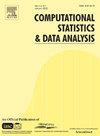Resampling NANCOVA: Nonparametric analysis of covariance in small samples
IF 1.6
3区 数学
Q3 COMPUTER SCIENCE, INTERDISCIPLINARY APPLICATIONS
引用次数: 0
Abstract
Analysis of covariance is a crucial method for improving precision of statistical tests for factor effects in randomized experiments. However, existing solutions suffer from one or more of the following limitations: (i) they are not suitable for ordinal data (as endpoints or explanatory variables); (ii) they require semiparametric model assumptions; (iii) they are inapplicable to small data scenarios due to often poor type-I error control; or (iv) they provide only approximate testing procedures and (asymptotically) exact test are missing. A resampling approach to the NANCOVA framework is investigated. NANCOVA is a fully nonparametric model based on relative effects that allows for an arbitrary number of covariates and groups, where both outcome variable (endpoint) and covariates can be metric or ordinal. Novel NANCOVA tests and a nonparametric competitor test without covariate adjustment were evaluated in extensive simulations. Unlike approximate tests in the NANCOVA framework, the proposed resampling version showed good performance in small sample scenarios and maintained the nominal type-I error well. Resampling NANCOVA also provided consistently high power: up to 26 % higher than the test without covariate adjustment in a small sample scenario with 4 groups and two covariates. Moreover, it is shown that resampling NANCOVA provides an asymptotically exact testing procedure, which makes it the first one with good finite sample performance in the present NANCOVA framework. In summary, resampling NANCOVA can be considered a viable tool for analysis of covariance overcoming issues (i) - (iv).
重采样NANCOVA:小样本协方差的非参数分析
协方差分析是提高随机试验中因子效应统计检验精度的重要方法。然而,现有的解决方案存在以下一个或多个限制:(i)它们不适合有序数据(作为端点或解释变量);(ii)它们需要半参数模型假设;(iii)由于第一类错误控制往往较差,它们不适用于小数据场景;或者(iv)它们只提供近似测试程序,而(渐近的)精确测试缺失。研究了NANCOVA框架的重采样方法。NANCOVA是一个基于相对效应的完全非参数模型,允许任意数量的协变量和组,其中结果变量(终点)和协变量可以是度量的或有序的。在广泛的模拟中评估了新型NANCOVA检验和无协变量调整的非参数竞争检验。与NANCOVA框架中的近似测试不同,所提出的重采样版本在小样本场景中表现出良好的性能,并且很好地保持了标称的i型误差。重新采样NANCOVA也提供了一致的高功率:在4组和两个协变量的小样本场景中,与没有协变量调整的测试相比,高达26%。此外,重新采样NANCOVA提供了一个渐近精确的测试程序,使其成为目前NANCOVA框架中第一个具有良好有限样本性能的测试程序。总之,重新采样NANCOVA可以被认为是协方差分析克服问题(i) - (iv)的可行工具。
本文章由计算机程序翻译,如有差异,请以英文原文为准。
求助全文
约1分钟内获得全文
求助全文
来源期刊

Computational Statistics & Data Analysis
数学-计算机:跨学科应用
CiteScore
3.70
自引率
5.60%
发文量
167
审稿时长
60 days
期刊介绍:
Computational Statistics and Data Analysis (CSDA), an Official Publication of the network Computational and Methodological Statistics (CMStatistics) and of the International Association for Statistical Computing (IASC), is an international journal dedicated to the dissemination of methodological research and applications in the areas of computational statistics and data analysis. The journal consists of four refereed sections which are divided into the following subject areas:
I) Computational Statistics - Manuscripts dealing with: 1) the explicit impact of computers on statistical methodology (e.g., Bayesian computing, bioinformatics,computer graphics, computer intensive inferential methods, data exploration, data mining, expert systems, heuristics, knowledge based systems, machine learning, neural networks, numerical and optimization methods, parallel computing, statistical databases, statistical systems), and 2) the development, evaluation and validation of statistical software and algorithms. Software and algorithms can be submitted with manuscripts and will be stored together with the online article.
II) Statistical Methodology for Data Analysis - Manuscripts dealing with novel and original data analytical strategies and methodologies applied in biostatistics (design and analytic methods for clinical trials, epidemiological studies, statistical genetics, or genetic/environmental interactions), chemometrics, classification, data exploration, density estimation, design of experiments, environmetrics, education, image analysis, marketing, model free data exploration, pattern recognition, psychometrics, statistical physics, image processing, robust procedures.
[...]
III) Special Applications - [...]
IV) Annals of Statistical Data Science [...]
 求助内容:
求助内容: 应助结果提醒方式:
应助结果提醒方式:


